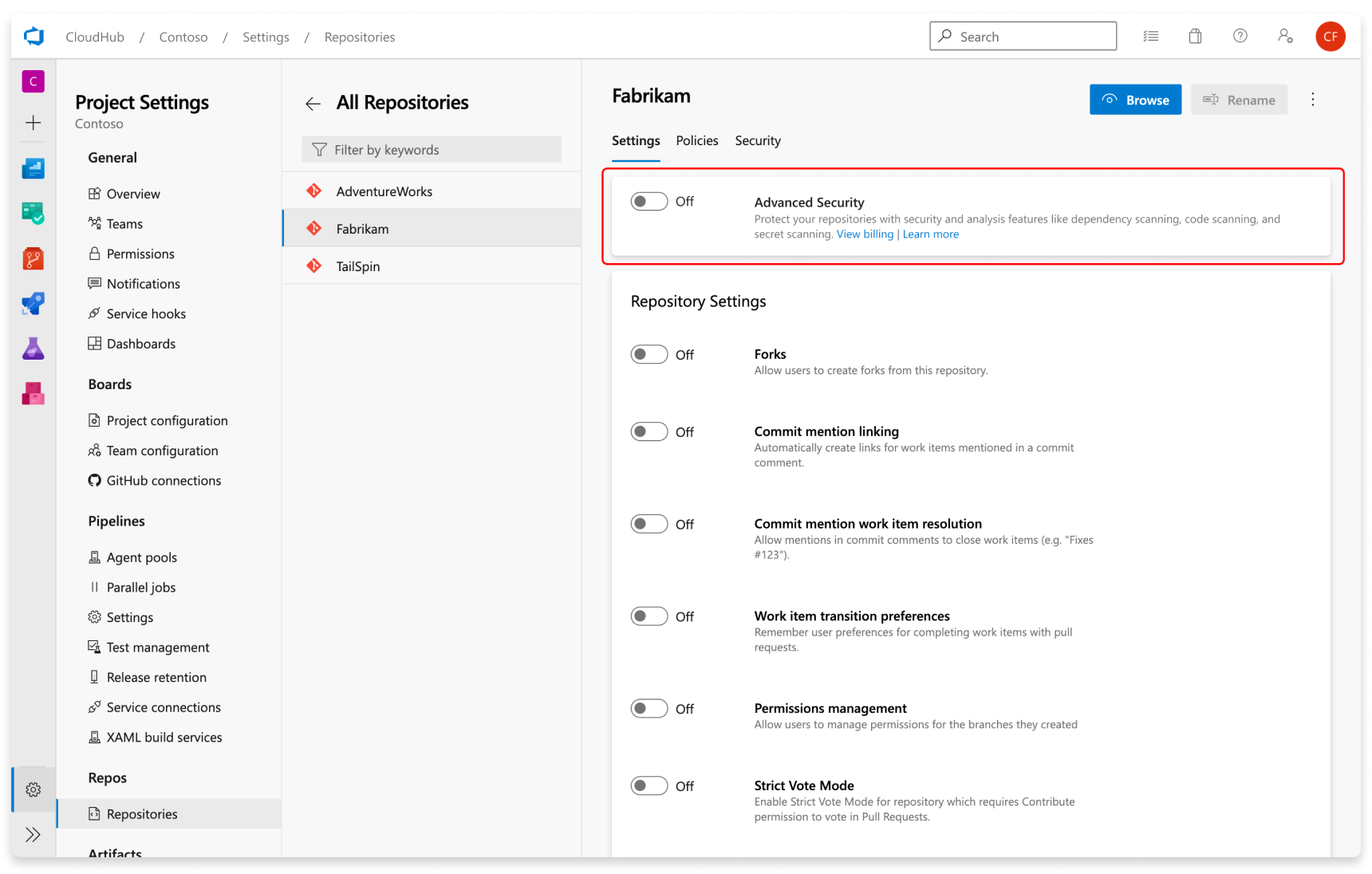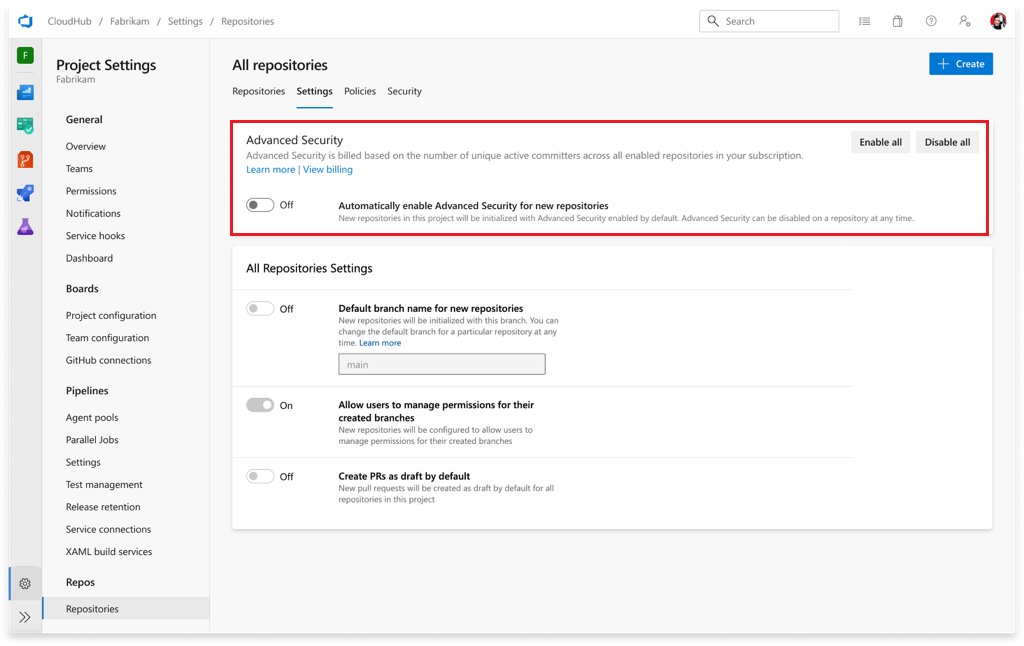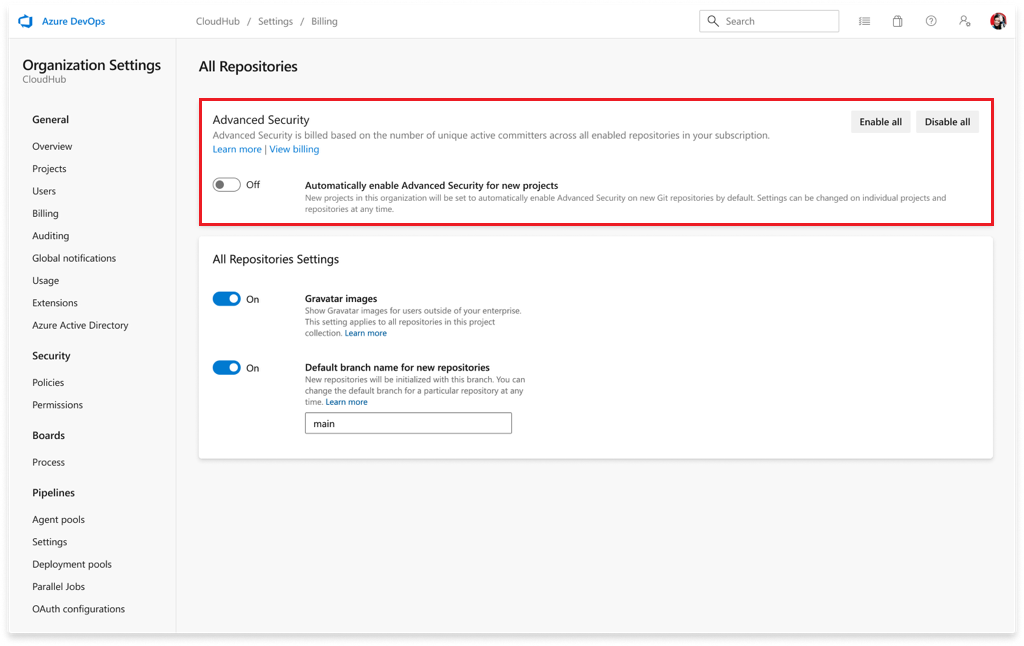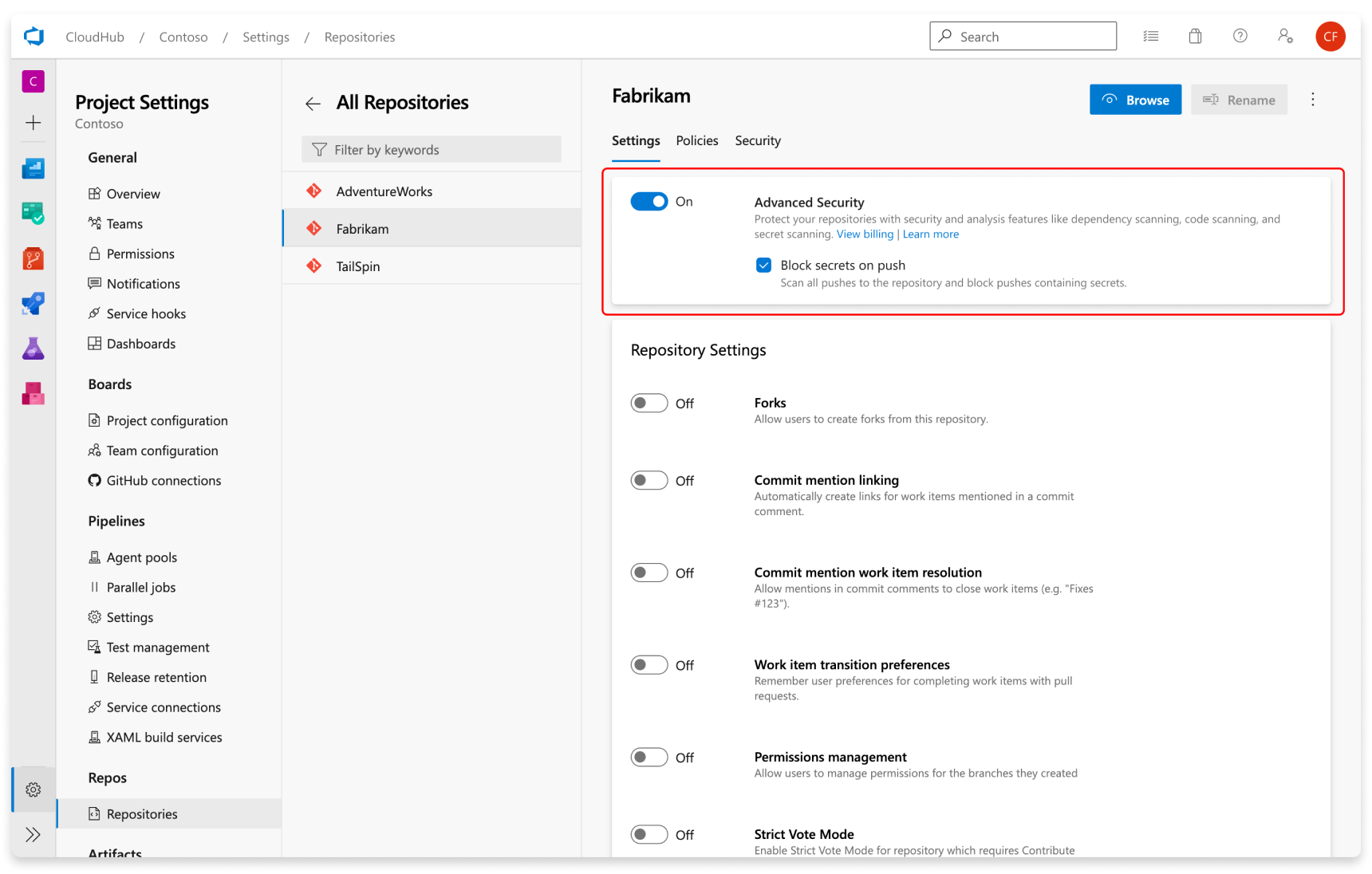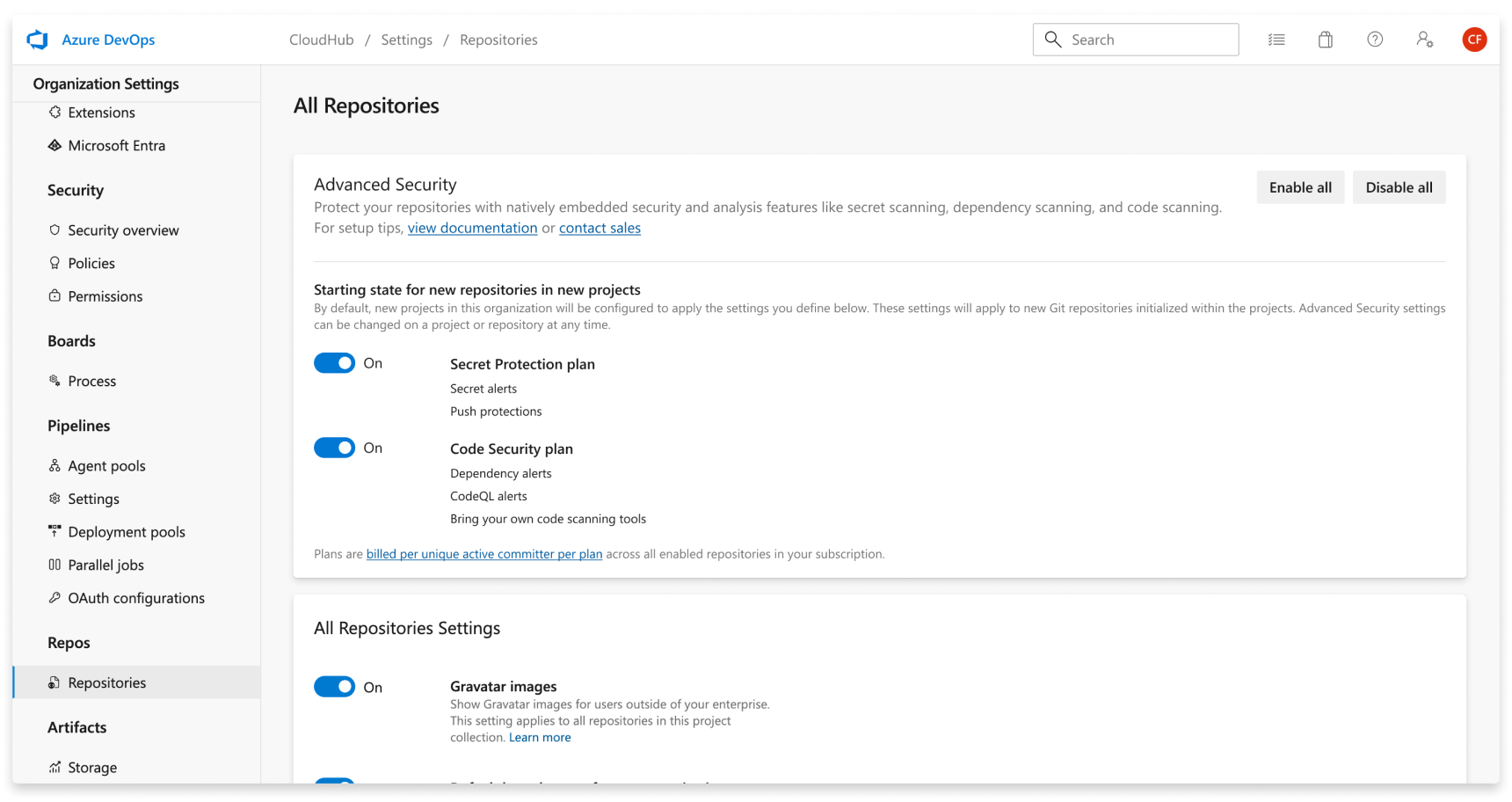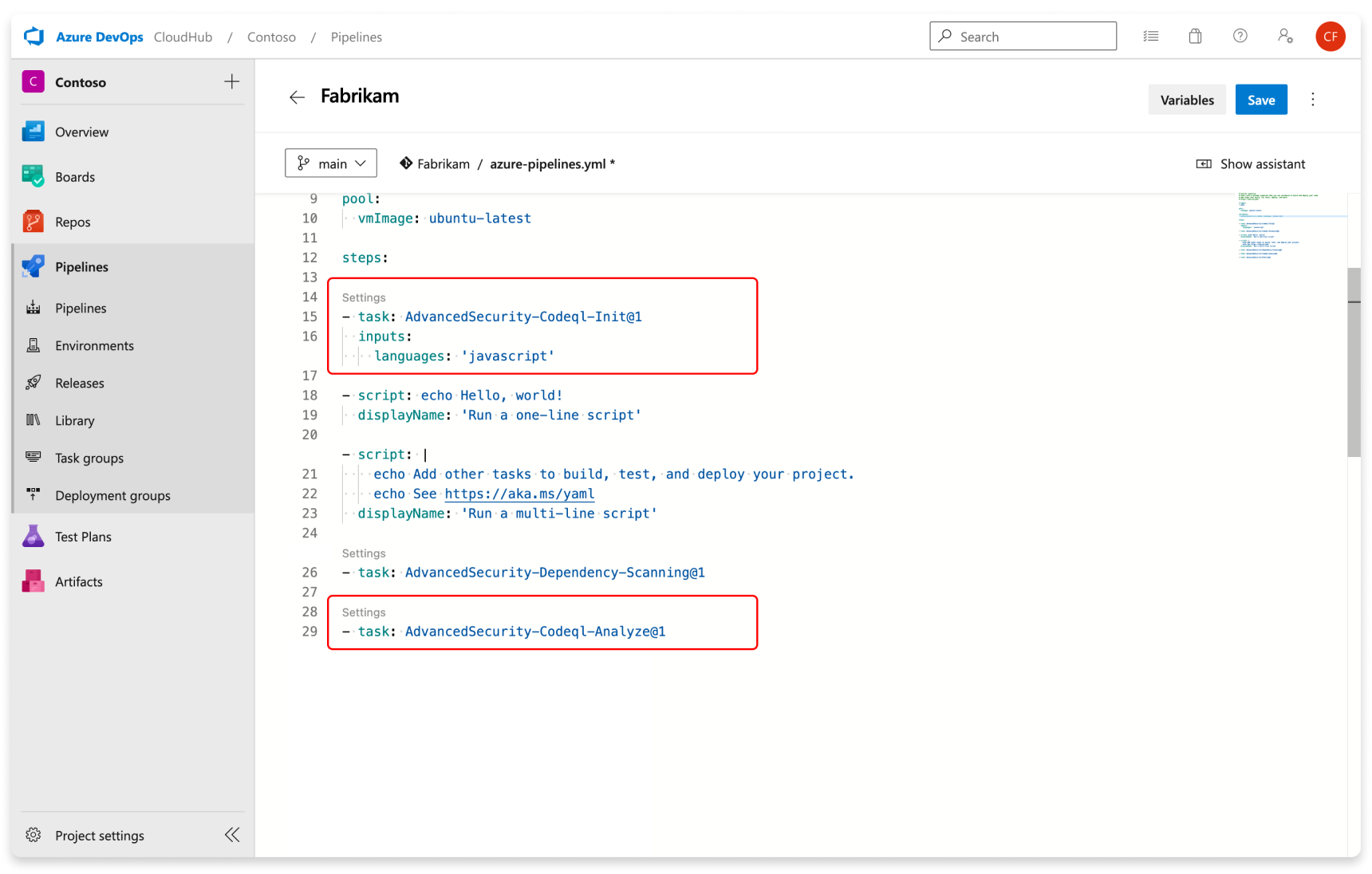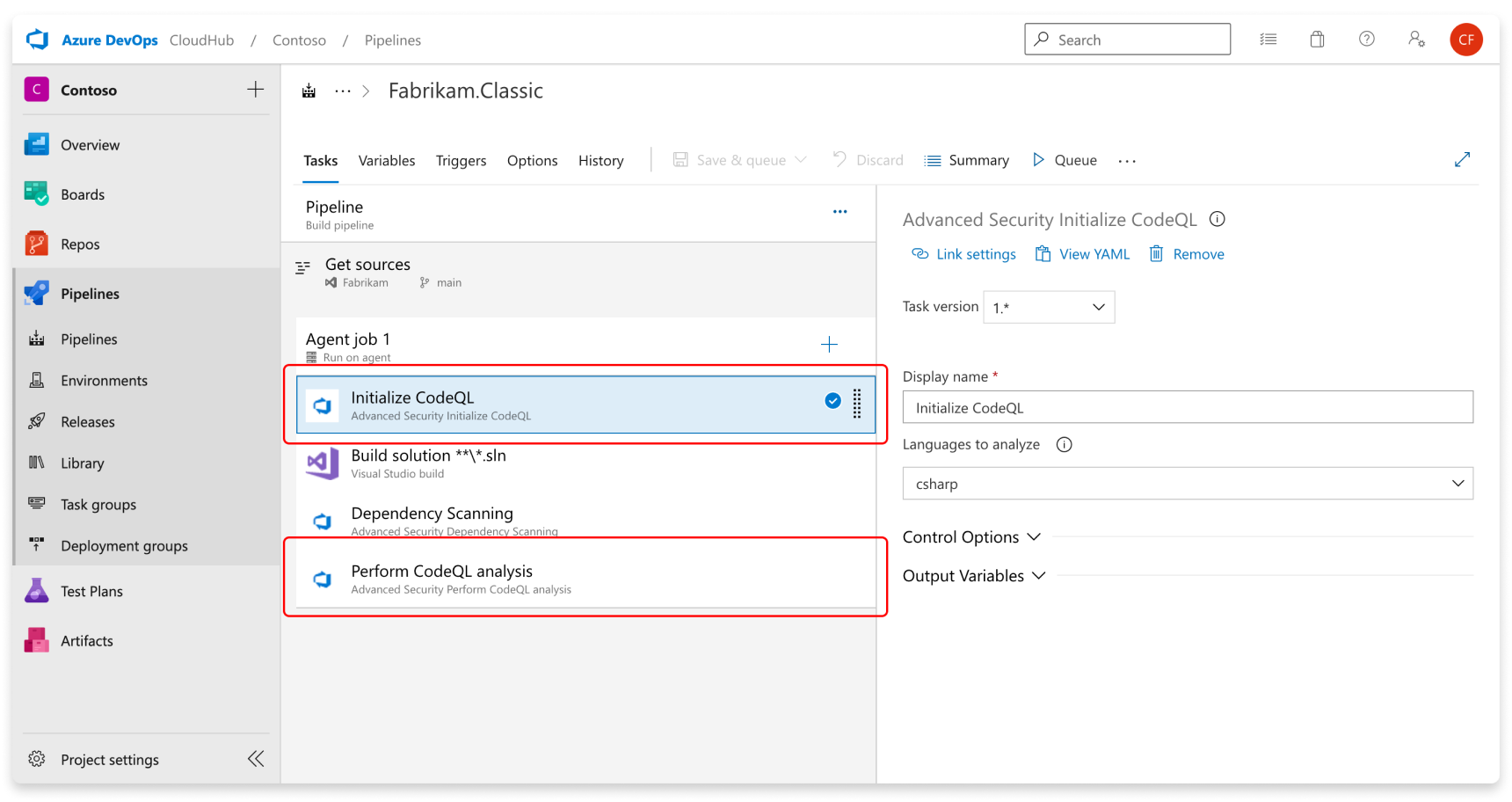Note
Access to this page requires authorization. You can try signing in or changing directories.
Access to this page requires authorization. You can try changing directories.
GitHub Advanced Security for Azure DevOps adds GitHub Advanced Security's suite of security features to Azure Repos and includes the following features:
- Secret Scanning push protection: check if code pushes include commits that expose secrets such as credentials
- Secret Scanning repo scanning: scan your repository and look for exposed secrets that were committed accidentally
- Dependency Scanning – search for known vulnerabilities in open source dependencies (direct and transitive)
- Code Scanning – use CodeQL static analysis engine to identify code-level application vulnerabilities such as SQL injection and authentication bypass
You can bring the protection of Advanced Security to your enterprise with the flexibility to enable the right level of protection for your repositories. GitHub Advanced Security for Azure DevOps is available as GitHub Secret Protection for Azure DevOps and GitHub Code Security for Azure DevOps.
Secret Protection includes the following features:
- Push protection, to prevent secret leaks before they happen
- Secret scanning alerts with notifications, to catch existing exposures before they become a problem
- Security overview, which provides insight into your organization's level of risk and security protection
Code Security includes the following features:
- Dependency alerts, to find vulnerabilities in open-source dependencies
- CodeQL scanning, to detect vulnerabilities directly in your code
- Security findings for third-party tools
- Security overview, which provides insight into your organization's level of risk and security protection
GitHub Advanced Security for Azure DevOps is only available for Azure DevOps Services and specifically for code Git repositories.
GitHub Advanced Security for Azure DevOps works with Azure Repos. To use GitHub Advanced Security with GitHub repositories, see GitHub Advanced Security.
Prerequisites
| Category | Requirements |
|---|---|
| Permissions | - To view a summary of all alerts for a repository: Contributor permissions for the repository. - To dismiss alerts in Advanced Security: Project administrator permissions. - To manage permissions in Advanced Security: Member of the Project Collection Administrators group or Advanced Security: manage settings permission set to Allow. |
For more information about Advanced Security permissions, see Manage Advanced Security permissions.
Extra prerequisites for self-hosted agents
If your organization uses self-hosted agents, add the following URLs to your Allowlist so the dependency scanning task can fetch vulnerability advisory data. For more information, see Allowed IP addresses and domain URLs.
| Domain URL | Description |
|---|---|
https://governance.dev.azure.com |
For organizations using the dev.azure.com domain to access their DevOps instance |
https://dev.azure.com |
For organizations using the dev.azure.com domain to access their DevOps instance |
https://advsec.dev.azure.com |
For organizations using the dev.azure.com domain to access their DevOps instance |
https://{organization_name}.governance.visualstudio.com |
For organizations using the {organization_name}.visualstudio.com domain to access their DevOps instance |
https://{organization_name}.visualstudio.com |
For organizations using the {organization_name}.visualstudio.com domain to access their DevOps instance |
https://{organization_name}.advsec.visualstudio.com |
For organizations using the {organization_name}.visualstudio.com domain to access their DevOps instance |
Run a compatible version of the .NET runtime (currently .NET 8.x). If a compatible version isn't present on the agent, the dependency scanning build task downloads .NET.
Ensure the CodeQL bundle is installed to the agent tool cache on your agent. You might utilize the
enableAutomaticCodeQLInstall: truevariable with theAdvancedSecurity-Codeql-Init@1pipeline task for YAML pipelines or select theEnable automatic CodeQL detection and installationcheckbox for classic pipelines. Alternatively, for manual installation instructions, see Code scanning for GitHub Advanced Security for Azure DevOps.
Enable GitHub Advanced Security
You can enable Advanced Security at the organization, project, or repository level. To access each of the scanning tools and results, you need to first enable Advanced Security. Once you enable Advanced Security, any future pushes containing secrets to a repository with this policy enabled are blocked, and repository secret scanning happens in the background.
Repository-level onboarding
- Go to your Project settings for your Azure DevOps project.
- Select Repos > Repositories.
- Select the repository you want to enable Advanced Security for.
- Select Enable and Begin billing to activate Advanced Security. A shield icon now appears in the repository view for any repository with Advanced Security enabled.
Project-level onboarding
- Go to your Project settings for your Azure DevOps project.
- Select Repos.
- Select the Settings tab.
- Select Enable all and see an estimate for the number of active committers for your project appear.
- Select Begin billing to activate Advanced Security for every existing repository in your project.
- Optionally, select Automatically enable Advanced Security for new repositories so that any newly created repositories have Advanced Security enabled upon creation.
Organization-level onboarding
- Go to your Organization settings for your Azure DevOps organization.
- Select Repositories.
- Select Enable all and see an estimate for the number of active committers for your organization appear.
- Select Begin billing to activate Advanced Security for every existing repository in each project in your organization.
- Optionally, select Automatically enable Advanced Security for new repositories so that any newly created projects have Advanced Security enabled upon creation.
Set up secret scanning
Secret scanning push protection and repository scanning are automatically enabled when you turn on Advanced Security. You can enable or disable secret push protection from the repository settings page.
Secret scanning repository scanning is automatically kicked off upon enabling Advanced Security for a selected repository.
Set up dependency scanning
You can enable Secret Protection or Code Security at the organization, project, or repository level.
Repository-level onboarding
- Go to your Project settings for your Azure DevOps project.
- Select Repos > Repositories.
- Select the repository you want to enable Advanced Security for.
- Toggle either Secret Protection or Code Security.
- Select Begin billing. A shield icon now appears in the repository view for any repository with either product enabled.
- To optionally enable dependency scanning default setup, select Options and enable the Dependency scanning default setup checkbox.
Project-level onboarding
- Go to your Project settings for your Azure DevOps project.
- Select Repos.
- Select the Settings tab.
- Select Enable all and see an estimate for the number of active committers per product for your project appear.
- Toggle your desired products of Secret Protection or Code Security.
- Select Begin billing to activate Secret Protection and/or Code Security for every existing repository in your project.
- Optionally, toggle Automatically enable Advanced Security for new repositories so that any newly created repositories have Secret Protection or Code Security enabled upon creation.
Organization-level onboarding
- Go to your Organization settings for your Azure DevOps organization.
- Select Repositories.
- Select Enable all and see an estimate for the number of active committers per product for your organization appear.
- Toggle your desired products of Secret Protection or Code Security.
- Select Begin billing to activate Advanced Security for every existing repository in each project in your organization.
- Optionally, toggle Automatically enable Advanced Security for new repositories so that any newly created projects have Secret Protection or Code Security enabled upon creation.
Set up secret scanning
Secret scanning push protection and repository scanning are automatically enabled when you turn on Secret Protection. You can enable or disable secret push protection from the repository settings page.
As mentioned, secret scanning repository scanning is automatically kicked off upon enabling Secret Protection for a selected repository.
Set up dependency scanning
To gain access to dependency scanning features, you need the Code Security product enabled for your repository.
Dependency scanning is a pipeline-based scanning tool. Results are aggregated per repository. For scanning your default branch, you can utilize the "Scan for vulnerable dependencies" setting from the repository settings page. This will automatically include the dependency scanning task into any pipeline targeting your default branch, or any pull request build targeting your default branch.
For more advanced setup or if you want to scan all branches, we recommend that you add the dependency scanning task to all the pipelines that you want scanned. See Dependency scanning for GitHub Advanced Security for Azure DevOps for more details.
Set up code scanning
To gain access to code scanning features, you need the Code Security product enabled for your repository.
Code scanning is also a pipeline-based scanning tool where results are aggregated per repository.
Tip
Code scanning can be a more time-intensive build task, so we recommend that you add the code scanning task to a separate, cloned pipeline of your main production pipeline or create a new pipeline.
Add the tasks in the following order:
- Advanced Security Initialize CodeQL (AdvancedSecurity-Codeql-Init@1)
- Your custom build steps
- Advanced Security Perform CodeQL Analysis (AdvancedSecurity-Codeql-Analyze@1)
Also, specify which language you're analyzing in the Initialize CodeQL task. You can use a comma separated list to analyze multiple languages at once. The supported languages are csharp, cpp, go, java, javascript, python, ruby, swift. If you're utilizing self-hosted agents, you might also add the enableAutomaticCodeQLInstall: true variable to automatically install the latest CodeQL bits for your agent.
Here's an example starter pipeline:
trigger:
- main
pool:
# Additional hosted image options are available: https://learn.microsoft.com/en-us/azure/devops/pipelines/agents/hosted#software
vmImage: ubuntu-latest
steps:
- task: AdvancedSecurity-Codeql-Init@1
inputs:
languages: "java"
# Supported languages: csharp, cpp, go, java, javascript, python, ruby, swift
# You can customize the initialize task: https://learn.microsoft.com/en-us/azure/devops/pipelines/tasks/reference/advanced-security-codeql-init-v1?view=azure-pipelines
# If you're using a self-hosted agent to run CodeQL, use `enableAutomaticCodeQLInstall` to automatically use the latest CodeQL bits on your agent:
enableAutomaticCodeQLInstall: true
# Add your custom build steps here
# - Ensure that all code to be scanned is compiled (often using a `clean` command to ensure you're building from a clean state).
# - Disable the use of any build caching mechanisms as this can interfere with CodeQL's ability to capture all the necessary data during the build.
# - Disable the use of any distributed/multithreaded/incremental builds as CodeQL needs to monitor executions of the compiler to construct an accurate representation of the application.
# - For dependency scanning, ensure you have a package restore step for more accurate results.
# If you had a Maven app:
# - task: Maven@4
# inputs:
# mavenPomFile: 'pom.xml'
# goals: 'clean package'
# publishJUnitResults: true
# testResultsFiles: '**/TEST-*.xml'
# javaHomeOption: 'JDKVersion'
# jdkVersionOption: '1.17'
# mavenVersionOption: 'Default'
# Or a general script:
# - script: |
# echo "Run, Build Application using script"
# ./location_of_script_within_repo/buildscript.sh
- task: AdvancedSecurity-Dependency-Scanning@1 # More details on this task: https://learn.microsoft.com/en-us/azure/devops/pipelines/tasks/reference/advanced-security-dependency-scanning-v1?view=azure-pipelines
- task: AdvancedSecurity-Codeql-Analyze@1 # More details on this task: https://learn.microsoft.com/en-us/azure/devops/pipelines/tasks/reference/advanced-security-codeql-analyze-v1?view=azure-pipelines
Also, specify which language you're analyzing in the Initialize CodeQL task. If the language specified is swift, custom build steps are required.
Tip
- Use
javato analyze code written in Java, Kotlin or both. - Use
javascriptto analyze code written in JavaScript, TypeScript, or both.
If you're running on a self-hosted agent, select the Enable automatic CodeQL detection and installation to automatically use the latest CodeQL bits on your agent if you didn't manually install the latest CodeQL bundle to your agent tool cache.
To generate alerts, run your first scan with a pipeline with the code scanning tasks included.
Set up pull request annotations
For both dependency scanning and code scanning, annotations automatically configure for pull requests where a build validation policy applies with dependency scanning and/or code scanning tasks included in your pipeline. For more information on configuring build validation policies, see Build validation.
Pull request annotations also require an Advanced Security scan on your default branch and target branch before then scanning your source (pull request) branch. For more information on resolving alerts for pull request branches, see Managing dependency scanning alerts on pull requests and Managing code scanning alerts on pull requests.
To disable Advanced Security, any alerts and state of alerts get retained in the Advanced Security tab for the next time you re-enable Advanced Security for your repository.
Related articles
- Code scanning alerts for GitHub Advanced Security for Azure DevOps
- Dependency scanning alerts for GitHub Advanced Security for Azure DevOps
- Secret scanning alerts for GitHub Advanced Security for Azure DevOps
- Permissions for GitHub Advanced Security for Azure DevOps
- Billing for GitHub Advanced Security for Azure DevOps
